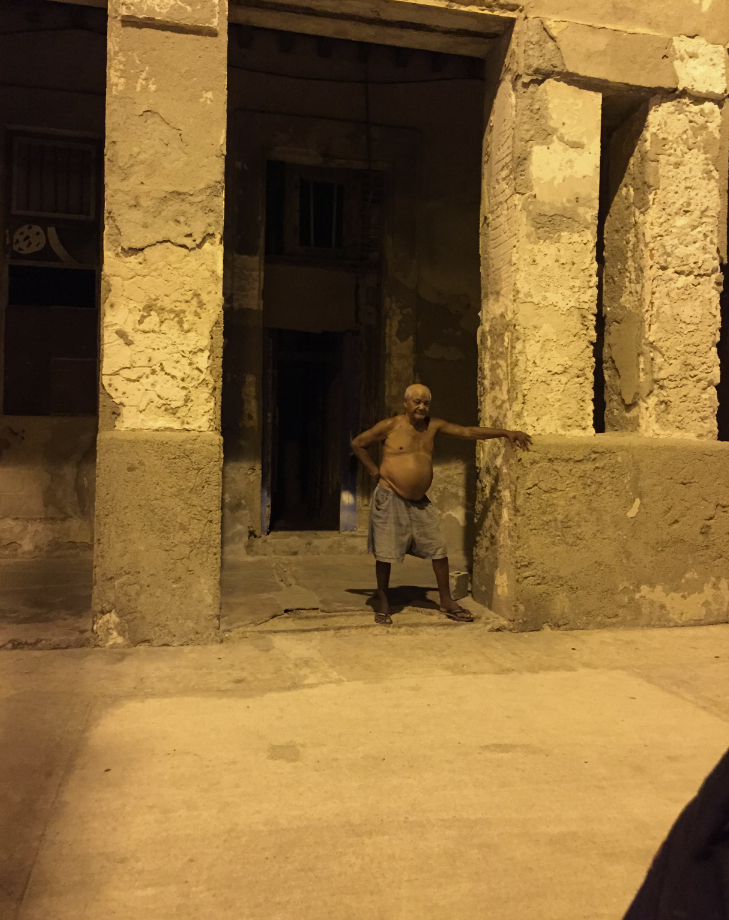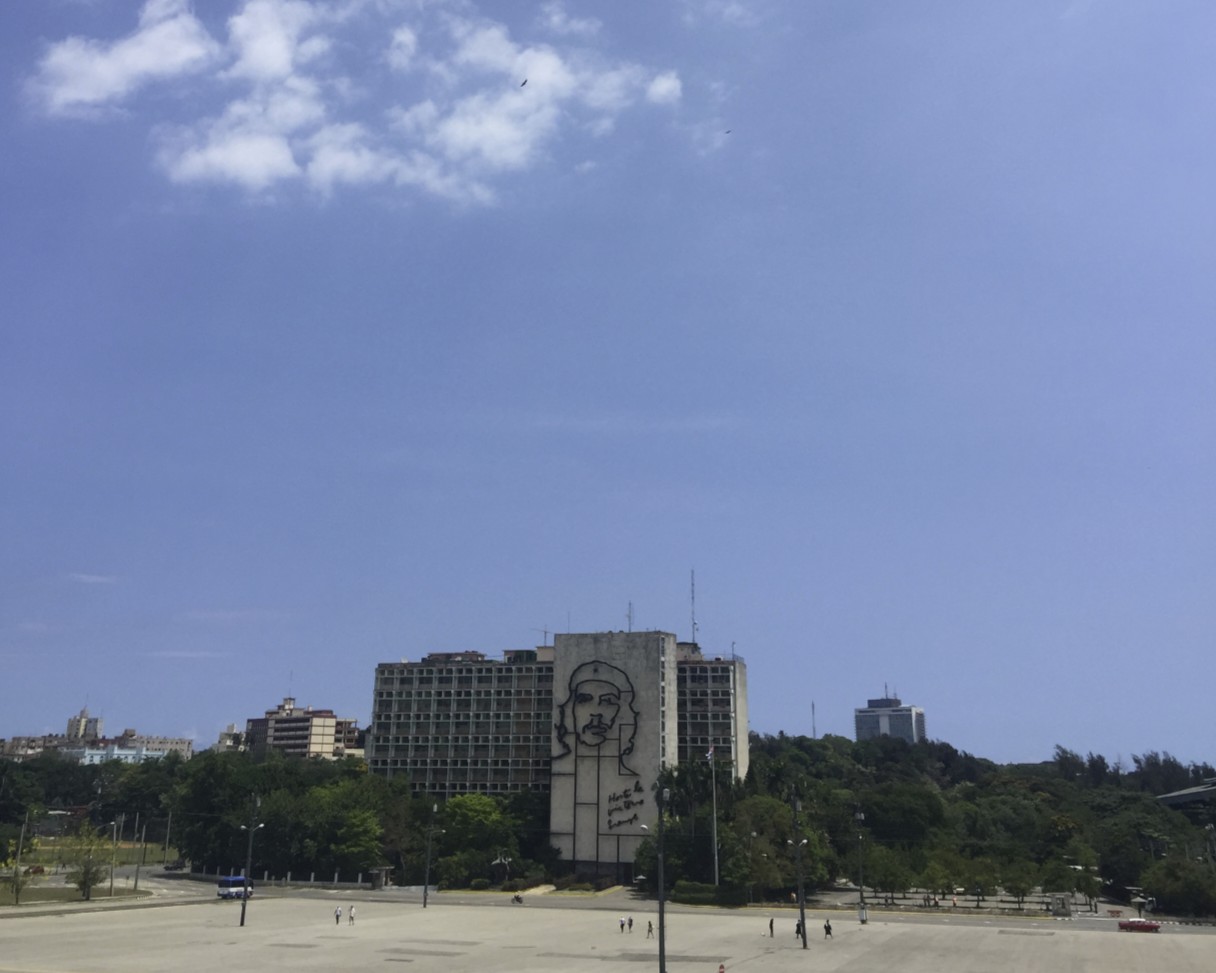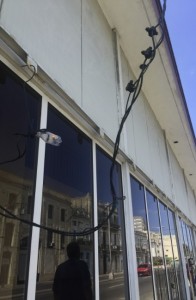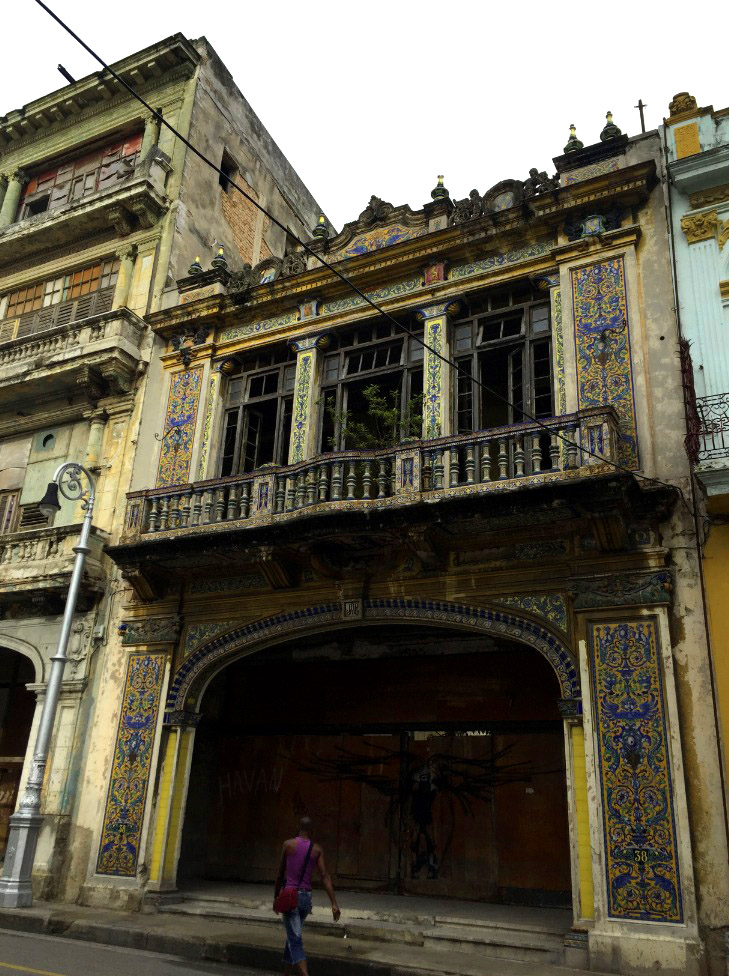 I may have returned from Cuba a more informed tourist, but I remain a clumsy narrator, for I’ve experienced more than I know how to process at once.
I may have returned from Cuba a more informed tourist, but I remain a clumsy narrator, for I’ve experienced more than I know how to process at once.
So, with my eye ever on excuses (and a reliance on my iPhone camera for more complete coverage), I’ll just jump right in.
Our casa particular was in Habana Centro, the most densely populated district in the city of Havana, where much of life is spent where the action is: right outside the building in which one lives. Street sports like handball, self-regulating pet and child care, gossip, singing merchants, colorful laundry  being pinned to decaying balconies, inventive refuse repurposing, prostitution, championship dominoes, and, of course, more vintage Chevy tweaking than outside a Barrett-
being pinned to decaying balconies, inventive refuse repurposing, prostitution, championship dominoes, and, of course, more vintage Chevy tweaking than outside a Barrett- Jackson auction are daily occurrences, rain or shine. Drivers use their horns in polite little taps to warn pedestrians, slower cars, and ubiquitous bicycle taxis that they’re approaching from behind, because walking in the middle of the narrow streets is necessary – and not because the city lacks sidewalks. This is about Darwinian natural selection: misshapen rebar barely clinging to crumbles of concrete isn’t just a photo op, it’s a reminder that falling chunks of rotting rooftops are common, especially following an afternoon downpour. Our local host was explaining this to my wife when a basketball sized slab of wall proved his point a few feet away.
Jackson auction are daily occurrences, rain or shine. Drivers use their horns in polite little taps to warn pedestrians, slower cars, and ubiquitous bicycle taxis that they’re approaching from behind, because walking in the middle of the narrow streets is necessary – and not because the city lacks sidewalks. This is about Darwinian natural selection: misshapen rebar barely clinging to crumbles of concrete isn’t just a photo op, it’s a reminder that falling chunks of rotting rooftops are common, especially following an afternoon downpour. Our local host was explaining this to my wife when a basketball sized slab of wall proved his point a few feet away.
A curious observation was noting, after about three or four days, that I hadn’t seen a single feral dog or cat fight. The dogs, which often travel in packs, weren’t remotely aggressive toward the house pets sitting in doorways, alone or with their owners. The passivity and intermingling between residents and stray animals  seemed almost magical. Random bow-wow behavior and righteous open-air bowel movements were less enchanting, so I’m not talkin’ peting zoo here, but if you watch where you step, you’ll start to suspect dog walkers back home are useless con artists.
seemed almost magical. Random bow-wow behavior and righteous open-air bowel movements were less enchanting, so I’m not talkin’ peting zoo here, but if you watch where you step, you’ll start to suspect dog walkers back home are useless con artists.
 Thin-skinned, protective stroller-pushers and dad-bods beware: If you’re afraid hard-luck Havana may eat your hypertrophied children alive, I recommend sticking with the Sandals® resort one island over. (Live wires capped with empty water bottles anyone?) That, or send your kids to Cuba with a trusted guardian, as you’ll just meddle with their learning curve and screw up a great thing.
Thin-skinned, protective stroller-pushers and dad-bods beware: If you’re afraid hard-luck Havana may eat your hypertrophied children alive, I recommend sticking with the Sandals® resort one island over. (Live wires capped with empty water bottles anyone?) That, or send your kids to Cuba with a trusted guardian, as you’ll just meddle with their learning curve and screw up a great thing.
 Easily 90% of the Cubans we encountered were gracious, generous, patient, and curious – especially when they learned we were from California or Estados Unidos. To add that they were friendly and cheerful isn’t necessary because those traits are standard-issue among the modest, but it’s still a bit surprising when you consider the steady state diet of anti-imperialism Cubans have been fed. Personal accountability and a glaring absence of excuses were as regular –and as notable– as the giant cracks of thunder and the billowing clouds above.
Easily 90% of the Cubans we encountered were gracious, generous, patient, and curious – especially when they learned we were from California or Estados Unidos. To add that they were friendly and cheerful isn’t necessary because those traits are standard-issue among the modest, but it’s still a bit surprising when you consider the steady state diet of anti-imperialism Cubans have been fed. Personal accountability and a glaring absence of excuses were as regular –and as notable– as the giant cracks of thunder and the billowing clouds above.

 My biggest takeaway is embarrassment for the many resources we privileged Westerners have –and waste– mixed with gratitude for having witnessed one example after the next of life lived in the moment. Here on the continent, we pay money to see what presence of mind feels like: we sign up for yoga classes, buy motivational posters, take pre-packaged adventure vacations, subscribe to detoxes and cleanses, and lease new luxury vehicles annually because we believe we “deserve” a win. We apply bumper stickers urging us to randomly assert our interpretation of kindness on strangers, and we consider Burning Man a worthy pilgrimage.
My biggest takeaway is embarrassment for the many resources we privileged Westerners have –and waste– mixed with gratitude for having witnessed one example after the next of life lived in the moment. Here on the continent, we pay money to see what presence of mind feels like: we sign up for yoga classes, buy motivational posters, take pre-packaged adventure vacations, subscribe to detoxes and cleanses, and lease new luxury vehicles annually because we believe we “deserve” a win. We apply bumper stickers urging us to randomly assert our interpretation of kindness on strangers, and we consider Burning Man a worthy pilgrimage.
So take all of that away: take away the “values” provided to us by giant merchants of lethargy, and replace it with, well, nothing. What do you get?
 It took me a day or two to recognize it. You get free-range self-esteem. You get to know your neighbors. Unless they’re drunk and rambling, your eyes don’t glaze over when the conversation turns to them and their lives, because they’re not telling you about their latest acquisition or grudge; they actually have something interesting or useful to share. You get unbridled enthusiasm for a game of soccer played with a rock, and you get the sense that people are secure in nothing save for who they are.
It took me a day or two to recognize it. You get free-range self-esteem. You get to know your neighbors. Unless they’re drunk and rambling, your eyes don’t glaze over when the conversation turns to them and their lives, because they’re not telling you about their latest acquisition or grudge; they actually have something interesting or useful to share. You get unbridled enthusiasm for a game of soccer played with a rock, and you get the sense that people are secure in nothing save for who they are.
 Too many Americans I know would view life in Habana Centro with utter terror. A truly jaw-dropping case in point would have to be a United States person who e-mailed the ex-pat New Yorker to say that she refuses to visit Cuba because she’d been told that African FGM is practiced on the island.
Too many Americans I know would view life in Habana Centro with utter terror. A truly jaw-dropping case in point would have to be a United States person who e-mailed the ex-pat New Yorker to say that she refuses to visit Cuba because she’d been told that African FGM is practiced on the island.
But visiting Cuba and laughing at the woefully and willingly uninformed did not leave me with a sense of superiority; rather it left me with a sense of addition to my soul.
Don’t get me wrong: pizza shops are popular in Havana because pizza is quick and cheap, so in the end, Walmart et al. just might do well there. And cell phones abound in the hands of young people, who may, like us, go hog wild if given the chance. For now, though, you don’t see people walking around consumed by life on a tiny screen, measuring their emotional worth by comparisons to others on Facebook.
Cubans no longer eat rats and cats, as many did in the darkest days of the 1990s when the US embargo was  strengthened by the collapse of the Soviet Union (80% of the island’s imports vanished), but they are still subject to ration cards.
strengthened by the collapse of the Soviet Union (80% of the island’s imports vanished), but they are still subject to ration cards.
 They stand in line on a daily basis for bread, rice, coffee, and other basics. When something gets thrown away in Cuba, it has lived far more lives than its manufacturer intended: everything is recycled, repaired, and renewed in one way or another. Garbage offends houseflies for its lack of substance. Once commanding department stores modeled after those in America in the 1940s and ’50s are limited to staples like soap and shoes, which leaves a lot of empty floor space.
They stand in line on a daily basis for bread, rice, coffee, and other basics. When something gets thrown away in Cuba, it has lived far more lives than its manufacturer intended: everything is recycled, repaired, and renewed in one way or another. Garbage offends houseflies for its lack of substance. Once commanding department stores modeled after those in America in the 1940s and ’50s are limited to staples like soap and shoes, which leaves a lot of empty floor space.
 You don’t need to know much about Cuba to know that survival often means utilizing a ghost economy, what most of us movie-lovers would refer to as a black market. For instance, we were given a better exchange rate from a transaction that took place in a bedroom at the back of a dilapidated tenement than we would have received at a bank, though the numerous corridors and staircases made it feel like a drug deal where you hold your tongue as tightly as your cash.
You don’t need to know much about Cuba to know that survival often means utilizing a ghost economy, what most of us movie-lovers would refer to as a black market. For instance, we were given a better exchange rate from a transaction that took place in a bedroom at the back of a dilapidated tenement than we would have received at a bank, though the numerous corridors and staircases made it feel like a drug deal where you hold your tongue as tightly as your cash.
 Stepping into the young entrepreneur’s home one at a time, we traded $1000 for roughly 930 Cuban Convertible Pesos (CUC), and in one instance we purchased a brand-new stack of bills still sealed in their official banknote vault sleeves. Turns out this was all quite routine, as we’d go on to conduct several similar transactions, like purchasing Cohiba cigars from the son of a woman who worked in the factory to avoid the state’s markup. In fact, it took less than an hour on the ground to know we’d much rather our new friends have our dollars than out-in-the-open retailers – particularly foreign-affiliated ones.
Stepping into the young entrepreneur’s home one at a time, we traded $1000 for roughly 930 Cuban Convertible Pesos (CUC), and in one instance we purchased a brand-new stack of bills still sealed in their official banknote vault sleeves. Turns out this was all quite routine, as we’d go on to conduct several similar transactions, like purchasing Cohiba cigars from the son of a woman who worked in the factory to avoid the state’s markup. In fact, it took less than an hour on the ground to know we’d much rather our new friends have our dollars than out-in-the-open retailers – particularly foreign-affiliated ones.
 “Esto es Cuba,” we often heard with a shrug, as survival tactics and tolerances under socialismo were revealed to us. But survival in today’s Cuba is hardly limited to enterprising youngsters. Irma, our assigned tour guide at the Cementerio Cristóbal Colón, is a university mathematics professor moonlighting where she can to make a decent living. Taxi drivers often earn more than cardiologists – an unintended consequence of the Revolution’s complex socio-economic fingerprint.
“Esto es Cuba,” we often heard with a shrug, as survival tactics and tolerances under socialismo were revealed to us. But survival in today’s Cuba is hardly limited to enterprising youngsters. Irma, our assigned tour guide at the Cementerio Cristóbal Colón, is a university mathematics professor moonlighting where she can to make a decent living. Taxi drivers often earn more than cardiologists – an unintended consequence of the Revolution’s complex socio-economic fingerprint.
The lack of excuses from people with such a perceptible right to make them made my own seem that much louder and less supportable.
 Visiting from a world crowded with crybabies bitching about not
Visiting from a world crowded with crybabies bitching about not  being recognized, I was transfixed for a solid hour one day by an older man painting away the afternoon. If he’s lucky, he probably lives on about $24 a month, and with no evident delusions of applause or riches. I parked myself on a curb nearby to appreciate his need for self expression and (for me) the irony of his isolation behind security bars.
being recognized, I was transfixed for a solid hour one day by an older man painting away the afternoon. If he’s lucky, he probably lives on about $24 a month, and with no evident delusions of applause or riches. I parked myself on a curb nearby to appreciate his need for self expression and (for me) the irony of his isolation behind security bars.
 Out in the heartbreakingly gorgeous Viñales Valley, being driven around the Cordillera de Guaniguanico by Alexi, a Cuban gear-head who loves his ’54 Buick, I heard a lot about the many uses Cubanos have for different trees and plants. The info was practical: there are no carbon footprint points or social rewards for making absolute maximum use of the environment. That’s survival too, in its most common sense. And all of it, for this Americano, was as humbling and eye opening as it gets.
Out in the heartbreakingly gorgeous Viñales Valley, being driven around the Cordillera de Guaniguanico by Alexi, a Cuban gear-head who loves his ’54 Buick, I heard a lot about the many uses Cubanos have for different trees and plants. The info was practical: there are no carbon footprint points or social rewards for making absolute maximum use of the environment. That’s survival too, in its most common sense. And all of it, for this Americano, was as humbling and eye opening as it gets.
 Cuba isn’t a utopia by any stretch, but it’s one of the best places on earth, possibly even the best, for an eye-opening view of America’s and Americans’ place in the world. And I fear that the window on this distinctive viewpoint is closing quickly, so proceed accordingly. When you do, if you do, be prepared ditch your comfort zones, see your entitlements in a funhouse mirror, evolve, and make friends.
Cuba isn’t a utopia by any stretch, but it’s one of the best places on earth, possibly even the best, for an eye-opening view of America’s and Americans’ place in the world. And I fear that the window on this distinctive viewpoint is closing quickly, so proceed accordingly. When you do, if you do, be prepared ditch your comfort zones, see your entitlements in a funhouse mirror, evolve, and make friends.
 P.S. A lot has been written about Cuba, and I expect that the floodgates are about to open even further on that front as well. But for my book-buying dollar, there’s no more immersed or devoted Anglo voice than that of Conner Gorry, a freelance journalist/writer/bike polo enthusiast who covers all things Cuba and owns an English-language bookstore in Havana’s Vedado district.
P.S. A lot has been written about Cuba, and I expect that the floodgates are about to open even further on that front as well. But for my book-buying dollar, there’s no more immersed or devoted Anglo voice than that of Conner Gorry, a freelance journalist/writer/bike polo enthusiast who covers all things Cuba and owns an English-language bookstore in Havana’s Vedado district.
From Conner’s blog, Here is Havana, on her washing machine:
“It’s terrifically hard work keeping a Cuban household running (forget about smoothly); as you may imagine, laundry is a sticky bitch in the equation.
 Ah! To wash sheets at the touch of a button! To have jeans nearly extracted dry! I loved that machine even after it developed a high-pitched squeal like a Christmas pig having its throat cut. It was so loud and piercing, callers often asked: ‘what’s that sound in the background? Are you keeping pigs?!’ ‘No, just the rinse cycle.’”
Ah! To wash sheets at the touch of a button! To have jeans nearly extracted dry! I loved that machine even after it developed a high-pitched squeal like a Christmas pig having its throat cut. It was so loud and piercing, callers often asked: ‘what’s that sound in the background? Are you keeping pigs?!’ ‘No, just the rinse cycle.’”
What a happy coincidence to have been navigating the city, singing the praises of an app called Havana Good Time, only to find its creator (Gorry) swinging in a hammock next door to a place where you can get a tasty and filling little pizza for about 50 cents…
Finally…
If there’s any physical location on earth left where the song lyrics of Joe Strummer and Mick Jones are as applicable and relevant as the day they were written, it’s Cuba. Listening to the Clash as I walked around Havana bought back Strummer’s voice and the sociopolitical vibes of 1981 with such lucidity that I can, at long last, distance myself from the nostalgic aggrandizing of punk rock. For me, the planets will never align like that again. I no longer need remember “to kick it over.”
.


